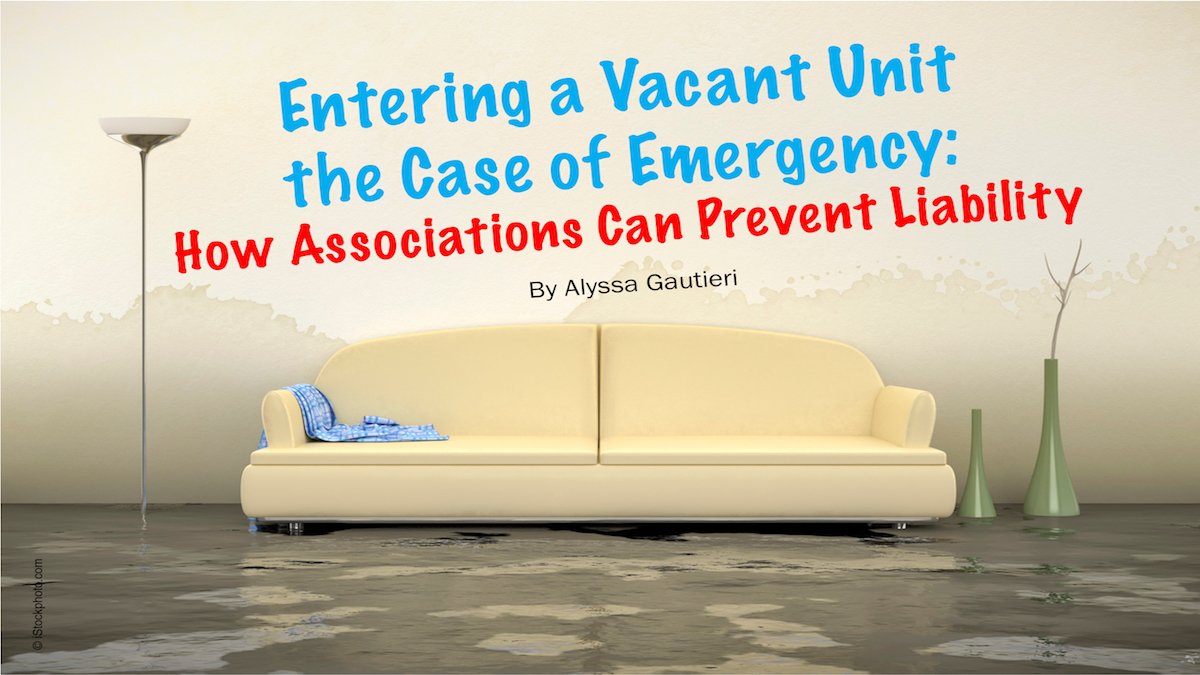
Entering a Vacant Unit the Case of Emergency: How Associations Can Prevent Liability
Feature Story
Entering a Vacant Unit the Case of Emergency: How Associations Can Prevent Liability
As the manager, did you make the right decision or have you just opened yourself up to potential liability?
A frantic resident calls and tells you that his hot water heater burst while he was at work and water is now pouring out onto the floor. Then, the resident reminds you he lives in a second-floor unit. When you arrive, it appears the hot water heater had burst hours earlier and water is likely leaking into the unit below. You try continually to contact the owners or occupants of the first-floor unit, but you receive no response. Hours have gone by and you know the damage is worsening each hour you wait. You decide you can not wait any longer. As the manager, you ask a board member what to do, and you both decide to use a key in the office to let yourselves in and assess the damage. As the manager, did you make the right decision or have you just opened yourself up to potential liability?
We spoke with David Byrne, an attorney with Ansell, Grimm & Aaron, PC in Princeton, New Jersey, Chairperson of that firm’s Community Association Law Group, to answer questions regarding what to do in emergency situations and how associations can protect themselves from liability with a proactive approach.
According to Byrne, “the New Jersey Condominium Act empowers a condominium to enter a unit in the event of an emergency.” Although a manager can technically enter a unit legally, there are specific protocols a manager must follow to ensure their entry abides by the law and prevents liability.
Following a manager’s entry into a townhouse or condominium, it is not abnormal for residents to accuse a manager of theft or damage. How can managers and associations avoid these accusations from developing into lawsuits?
According to Byrne, the most important precautions are to enter a unit with multiple persons and to take many photographs for evidence. Managers must be able to defend against any charges of improper conduct upon emergency entry. It is essential that a manager has substantial evidence to prove that it was absolutely necessary to enter the unit, said Byrne.
Byrne defined an emergency as a situation that presents an “ongoing risk” and that has the “capacity to damage common elements of a unit and/or other surrounding units.” Once a manager declares a situation an emergency, he should attempt to gain permission from the owners or occupants to enter. In the event that a manager can not get in contact with anyone, it may be essential for the manager to enter the unit anyway.
According to Byrne, “a condominium may have a duty to enter a unit and/or take action in the event of an emergency whether there was or was not a response from the owners of the unit. The relevance of a form permitting an association to enter in an emergency and/or a verbal response permitting entry will depend upon the situation.”
In addition, just because a unit’s owner or occupant fills out a form giving the association permission to enter in an emergency, does not mean the association is entirely free from liability. According to Byrne, each situation is different and dependent on a variety of factors.
“Generally speaking, an agreement by which a person and/or entity waives his/its rights with respect to something that hasn’t happened yet are void, as against public policy. One who knows he cannot be liable for his actions and/or inactions when entering a unit is likely to not care what he does or doesn’t do. Also, in some circumstances a condominium is obligated to take a particular action, whether or not an owner signs a form. In that case, a form could be void as lacking legally sufficient consideration,” said Byrne.
If a key is left with the management office, is it assumed that management can enter without getting specific permission to enter during an emergency? Again, the answer to this question is ambiguous. If a key is left with the management office, it may seem that management can enter a unit without getting specific permission. However, Byrne told us that management can not make these types of assumptions.
“Generally, it would depend upon the circumstances. If, for instance, the unit’s occupant leaves a key voluntarily, then perhaps condominium entrance is allowed without fanfare. If, however, the occupant must leave a key, by virtue of a rule or such, the rights of the condominium related to said key should presumably be part of any rule by which the mandate was set,” said Byrne.
According to Byrne, a condominium has various duties to protect common elements and/or units, which may necessitate the entry into a unit, regardless of foreclosure, ownership status of a unit, or lack of permission from an owner. At the end of the day, the condominium must fulfill its obligations regardless of an owner’s or occupant’s response or opposition.
Tags: Article
Trackback from your site.